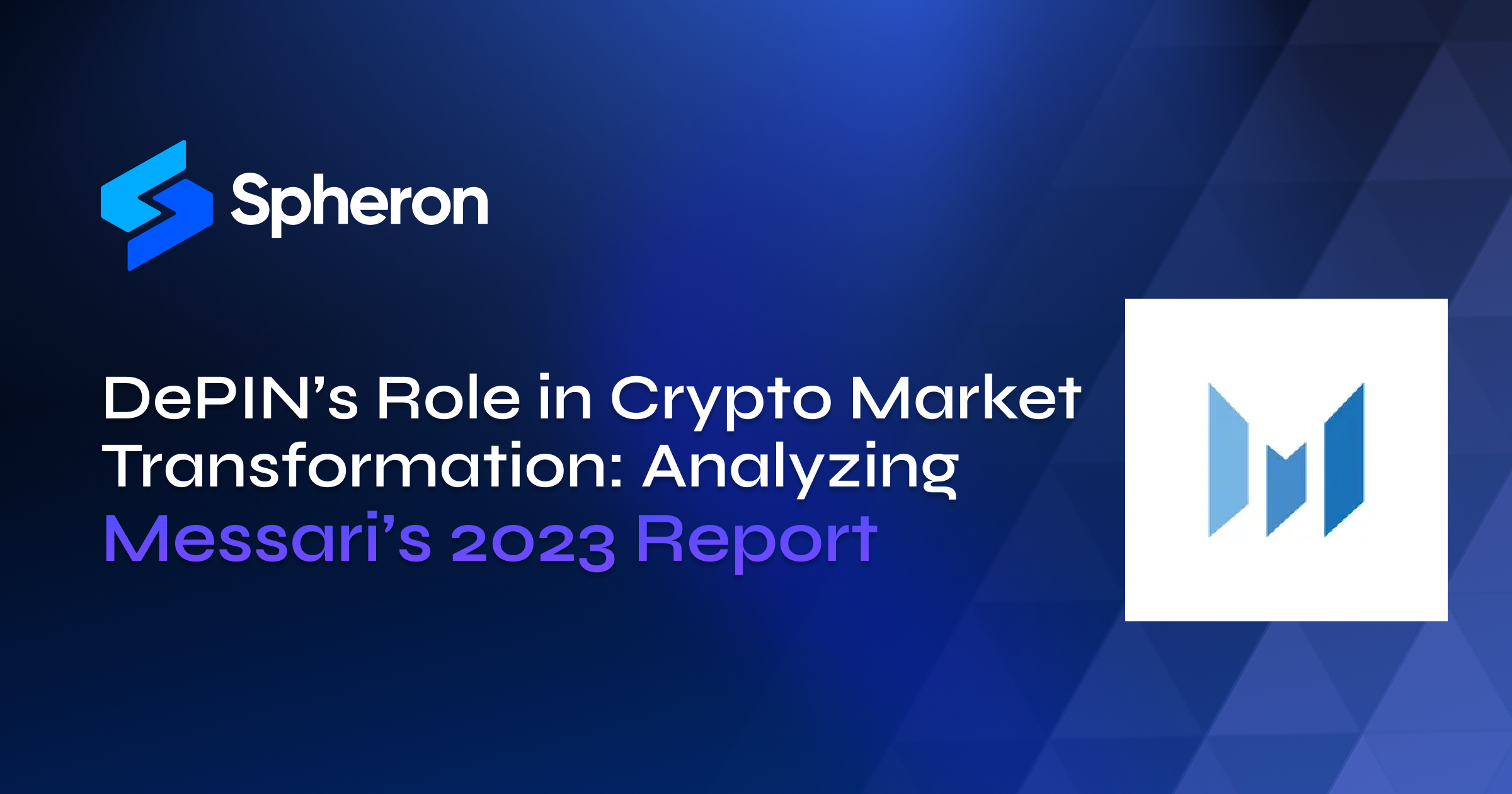DePIN’s Role in Crypto Market Transformation: Analyzing Messari’s 2023 Report
 Spheron Network
Spheron NetworkTable of contents
- Highlights Of Messari’s 2023 Report
- Understanding DePIN and Its Impact on the Crypto Market
- Exploring the Potential of DePIN Technology
- Key Projects and Funding in the DePIN Sector
- Blockchain Ecosystem for DePIN
- Innovative Revenue Strategy and Sustainable Growth
- Expansion of DePIN Networks
- Emerging Trends and Market Impact: The Rise of DePIN
- Conclusion

You can download the Messari's 2023 Report - Here
Cryptocurrency has been a hot topic for years, but there's a new player on the scene: DePIN, or decentralized physical infrastructure network. In simple terms, DePIN is all about using cryptocurrency to build and maintain things like Wi-Fi networks, cloud storage, and mobile technology.
A recent report from Messari takes a deep dive into DePIN, showing how much it's grown and how it could change the cryptocurrency world. Imagine a future where anyone with the right gear can help build essential infrastructure, making the digital world more accessible to everyone.
This blog will break down the highlights of the Messari report in easy-to-understand language so you can see just why DePIN is such a big deal and how it might shape the future of cryptocurrency.
Highlights Of Messari’s 2023 Report
The Decentralized Physical Infrastructure Network (DePIN) employs cryptographic incentives to coordinate critical infrastructure construction and operation efficiently.
By 2023, the DePIN ecosystem has expanded to over 650 projects, spanning six sub-fields: computing (250), artificial intelligence (200), wireless (100), sensors (50), energy (50), and services (25).
DePIN, accompanied by liquid tokens, boasts a market capitalization exceeding 20 billion USD, with annualized on-chain revenue of about USD 15 million.
Unlike income streams reliant on speculation, DePIN's revenue demonstrated remarkable resilience during the last market cycle. While the broader crypto market plummeted by 70-90%, DePIN's revenue saw a modest 20-60% decline from its peak.
DePIN has attracted over 600,000 new nodes, predominantly from software-based DePIN utilizing advanced sensors within mobile phones.
2024 DePIN may explore ZK technology, integrate meme coins, incorporate on-chain artificial intelligence, and delve into on-chain gaming.
Understanding DePIN and Its Impact on the Crypto Market
DePIN, short for decentralized physical infrastructure, is a rapidly emerging concept within the cryptocurrency community. A comprehensive report by Messari titled “The State of DePIN 2023” thoroughly examines this topic, shedding light on its considerable growth and potential impact on the broader crypto market. DePIN encompasses various projects leveraging cryptocurrency incentives to build and maintain physical infrastructure.
These projects span diverse areas, including decentralized Wi-Fi networks, innovative cloud storage solutions, and advanced mobile network technologies. A notable aspect of DePIN projects is their inclusive nature, enabling anyone with the necessary hardware to participate actively.
This participatory approach democratizes the development of critical infrastructure, fostering a more decentralized and accessible digital ecosystem. Such advancements in crypto technology also directly influence industries like iGaming, enhancing profitability and attractiveness for newcomers. Exploring gambling sites not affiliated with Gamstop 2024 can provide further insights into this intersection.
Exploring the Potential of DePIN Technology
The Messari report illuminates the vast potential of DePIN, projecting its potential to contribute up to $1 trillion to the global GDP over the next decade. This forecast underscores the significant economic implications of DePIN, poised to revolutionize the construction and operation of physical infrastructure.
Furthermore, the report delves into various sectors where DePIN is already making significant advancements. For example, within the digital mapping industry, DePIN initiatives are elevating the precision and accessibility of geographical data. Decentralized grids are emerging in the energy sector, offering more robust and efficient power distribution systems.
Moreover, diverse applications are emerging in pet and livestock management, where DePIN technologies facilitate innovative animal care solutions. The DePIN landscape is broadly categorized into six key areas: compute, wireless, energy, AI, services, and sensors.
These sectors represent the foundational areas where DePIN is expected to exert the most profound influence. With a collective market capitalization exceeding $20 billion and substantial investments from venture capitalists, there is growing confidence and interest in the DePIN sector.
Key Projects and Funding in the DePIN Sector
The DePIN sector is marked by pioneering initiatives, with Filecoin, Helium, and Render Network emerging as standout examples due to their substantial funding rounds and innovative endeavors. Filecoin, renowned for its focus on decentralized storage solutions, has garnered immense support with a $250 million funding round, showcasing strong market confidence in its potential.
Helium, another prominent project, has achieved a similar milestone with its $250 million funding round, underscoring its success in decentralized wireless networks. Render Network, specializing in decentralized digital rendering services, has significantly advanced with a $100 million funding round.
These considerable investments, particularly the growing trend of post-ICO funding, signify a resounding vote of confidence from investors in the enduring viability and success of these DePIN projects.
The escalating financial backing is compelling evidence that DePIN technologies are not merely futuristic concepts but practical, influential solutions that are reshaping the infrastructure landscape.
Blockchain Ecosystem for DePIN
The development and effectiveness of DePIN rely heavily on its integration with specific blockchain technologies. Primarily, these encompass layer-one blockchains like Solana and layer-two solutions such as Caldera and Eclipse.
According to the Messari report, choosing these particular blockchain platforms is deliberate and not arbitrary. Factors such as transaction speed, minimal operational costs, and the adaptability of their programming environments make these blockchains highly suitable for DePIN projects.
Solana, for instance, is preferred for its exceptional throughput capabilities, which are essential for managing the extensive data and transactions inherent in DePIN applications. Meanwhile, Caldera and Eclipse, serving as layer-two solutions, offer scalability and efficiency, meeting the evolving requirements of DePIN projects. This strategic alignment with specific blockchains is crucial for the successful execution and future scalability of DePIN initiatives.
Innovative Revenue Strategy and Sustainable Growth
DePIN projects introduce a pioneering revenue generation strategy, prioritizing utility over speculative trading to ensure long-term viability. Users accessing DePIN services typically engage in token transactions, including purchasing, locking, or burning the project’s native tokens.
This mechanism fosters a consistent demand for tokens and aligns user incentives with the project's sustained success. As per the Messari report, this approach has resulted in substantial revenue, with annual on-chain earnings exceeding $15 million from these projects.
This achievement underscores the stable and expanding economic foundation of the DePIN sector, distinguishing it from the speculative revenue models prevalent in other cryptocurrency sectors.
Expansion of DePIN Networks
The Messari report highlights a notable trend: the exponential growth of DePIN nodes. Presently, the sector boasts over 600,000 active nodes, showcasing the rapid expansion of DePIN technologies.
This surge in nodes is primarily due to ongoing improvements in scalability and cost-efficiency within the DePIN infrastructure. As these projects become more accessible and economically viable to operate, more individuals and organizations are motivated to establish and manage nodes.
Moreover, the significance of tokenomics in driving this growth cannot be overstated. Through well-designed token models that offer financial incentives to node operators and users, DePIN projects have effectively spurred widespread participation and investment in their ecosystems.
This proliferation of nodes isn't merely a quantitative metric but also a qualitative indicator of the increasing adoption and integration of DePIN technologies into real-world applications.
Emerging Trends and Market Impact: The Rise of DePIN
The cryptocurrency landscape is poised for a transformative shift, according to insights from the Messari report, particularly with the emergence of DePIN. Rather than solely driven by financial applications, the next bull market in crypto is expected to be fueled by non-financial narratives, with DePIN at the forefront.
This anticipated trend signifies a noteworthy departure from the past focus on speculative financial products, shifting towards real-world applications that offer tangible utility. The report projects that DePIN will increasingly intersect with diverse sectors, indicating a multidisciplinary evolution of the technology.
These sectors encompass artificial intelligence (AI), where decentralized infrastructure can enhance computing capabilities securely; meme coins, presenting opportunities for innovative marketing and adoption strategies by blending popular culture with crypto; gaming, where DePIN could revolutionize player interaction and game economics; and privacy, addressing contemporary concerns with decentralized solutions that offer heightened security and user autonomy. These intersections represent unique convergences and highlight DePIN's potential to integrate with and enhance various technological domains.
Conclusion
DePIN stands at the forefront of revolutionizing cryptocurrency, offering a pivotal shift towards decentralizing physical infrastructures. Its impact is poised to ripple across digital communications and energy distribution sectors, ushering in efficiency, resilience, and accessibility.
This decentralization wave will spur wider cryptocurrency adoption as individuals increasingly grasp its tangible real-world applications and advantages.
The insightful analysis in the Messari report vividly portrays DePIN's current accomplishments and promising trajectory. It underscores DePIN's significance in the evolving cryptocurrency narrative, transcending mere speculation to become a foundational technology reshaping digital-era infrastructures.
The report's outlook on DePIN's future hints at a more interconnected and decentralized global landscape, where cryptocurrency emerges as a driving force propelling innovation and adoption across diverse sectors.
Subscribe to my newsletter
Read articles from Spheron Network directly inside your inbox. Subscribe to the newsletter, and don't miss out.
Written by

Spheron Network
Spheron Network
On-demand DePIN for GPU Compute